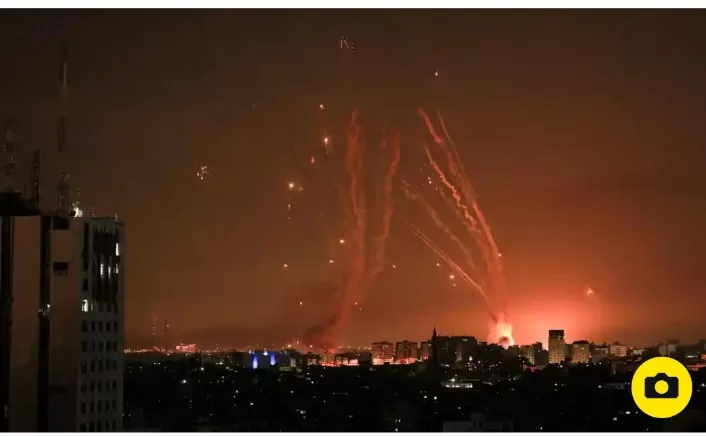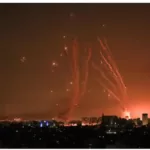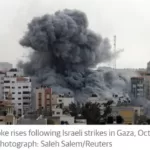In a swift response to recapture all the territories that fell under the control of Hamas fighters during the weekend, Israel has successfully regained authority. However, the situation remains volatile, as militant elements may still be present within Israeli territory, as indicated by a spokesperson for the defense forces.
Rear Admiral Daniel Hagari, the chief military spokesperson, disclosed that Israel had mobilized an unprecedented 300,000 reservists in reaction to the unexpected and multifaceted assault launched by Hamas from Gaza on Saturday. He emphatically declared that Israel is now “going on the offensive.”
Addressing the nation during a televised briefing on Monday, Hagari revealed the staggering human toll of the conflict, with 700 casualties recorded in Israel, including at least 73 members of the security forces. Meanwhile, the Palestinian health ministry reported over 100 fatalities overnight on Sunday due to Israeli retaliatory airstrikes in the Gaza Strip. This grim development raised the Palestinian death toll since Saturday to 493, with more than 2,750 individuals wounded.
Israeli rescue service Zaka reported the retrieval of over 260 bodies from the site of the Supernova music festival, near the Re’im kibbutz close to the Gaza border. This festival was brutally overrun by Hamas militants on Saturday. Shocking images and videos from the scene captured festivalgoers fleeing in panic while facing attacks from Hamas gunmen.
The incursion, which caught Israel’s highly-regarded military and intelligence apparatus off guard, has resulted in more than 100 hostages taken into Gaza. These events have brought intense combat to Israeli streets for the first time in decades.
Reports emerged on Monday of an active hostage situation in a kibbutz in southern Israel, along with ongoing rocket and artillery fire in the city of Ashkelon. Israeli forces reported clashes between an Israeli paratroop brigade and militants in the southern city of Sderot.
Despite Israel’s efforts, breaches remain in the triple-layered and electrified barrier encircling Gaza’s eastern border. It is believed that Hamas militants utilized a tunnel emerging near the town of Be’eri, situated 4 miles from the border. According to Israeli military spokesperson Lt. Col. Richard Hecht, 70 Hamas militants engaged in overnight fighting within the town.
Hecht characterized the past three days as a “change of paradigm.” There have been reports suggesting that an airstrike in Rafah, resulting in 25 casualties, was carried out without the customary warning shot, hinting at a potential shift in Israel Defense Forces’ (IDF) tactics. The IDF has provided no official statement regarding any alteration in its practices or the reported use of white phosphorus in Gaza, a densely populated area inhabited by more than 2 million people.
Early on Monday, IDF spokesperson Lt. Col. Jonathan Conricus described the situation in Israel as dire, emphasizing that it marked “by far the worst day in Israeli history” due to the unprecedented loss of life.
Drawing an analogy with US historical events, he likened the weekend’s attack to a combination of “9/11 and a Pearl Harbor wrapped into one” for Israel. Conricus revealed that a significant number of Israeli civilians and military personnel had been forcefully taken into Gaza, although he did not provide specific figures.
Hamas and Islamic Jihad militia have claimed to have abducted more than 130 individuals from Israel, demanding their release in exchange for thousands of Palestinians currently held in Israeli prisons. While these claims remain unconfirmed, they shed light on the extent of the abductions, which include soldiers, civilians, women, children, and older adults of various nationalities, including American dual nationals.
An Egyptian official involved in ceasefire negotiations disclosed that Israel sought assistance from Cairo to secure the safety of these hostages. Egypt had engaged in discussions regarding a potential ceasefire with both Palestinian militants and Israeli officials. However, Israel’s readiness for a truce remains uncertain.
Israeli forces continue their military operations in Gaza, with airstrikes leveling parts of Beit Hanoun in the northeastern region of the enclave. Hagari affirmed that these operations will persist relentlessly, targeting all Hamas gathering points and routes.
The Gaza Strip, housing 2.3 million residents in a densely populated area, faces escalating bombardments. The region has remained under Israeli blockade since 2006, following Hamas’s election, and experiences routine closures at its southern border with Egypt.
Tragically, residents in Gaza recount their terror, with nowhere to seek shelter from the intensifying assaults. Nasser Abu Quta reported that 19 members of his family and five neighbors perished in an airstrike on their refugee camp building in Rafah, southern Gaza. He asserted that the building was occupied solely by civilians, emphasizing its status as a safe haven for children and women.
In a UN Security Council emergency meeting on Sunday, the United States urged strong condemnation of “these heinous terrorist attacks committed by Hamas,” although no immediate action was taken. US Deputy Ambassador Robert Wood noted that many nations had already condemned the attacks.
Deborah Lipstadt, the US Special Envoy for Combating Antisemitism and a renowned Holocaust scholar, labeled the Hamas attacks “the most lethal assault against Jews since the Holocaust.” She unequivocally denounced the “heinous, barbaric terrorism against Israeli civilians” and mass murder.







